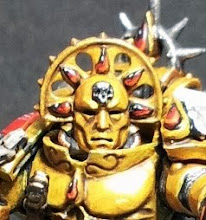She very aunty laiddat.
That's more or less how it's pronounced, anyway. The word "laiddat" is simply the way Chinese Malaysians/Singaporeans pronounce "like that", so in fact every word in the sentence is quite clearly English, i.e.:
She very aunty like that.
It's not a sentence I've ever used in the presence of gweilo friends, so I'm not quite sure what kind of a reaction that would get. I'm thinking along the lines of "zomgwtf???" But stick with me, this sentence does actually make perfect sense to Malaysians and Singaporeans.
In this sentence, "aunty" is not actually a noun, but an adjective. As such, the sentence could be rearranged to a more grammatically correct form:
She is very aunty-ish.
Here "laiddat" has been dropped as it doesn't actually serve any meaningful purpose in the sentence other than to make it roll off the Malaysian/Singaporean tongue more smoothly. "Aunty" is also pronounced slightly differently from the BBC-English way. In BBC-English, one would stress the first syllable, giving AHN-ty. However, Chinese Malaysians/Singaporeans stress the second syllable, i.e. ahn-TEE, preferably with a very slight nasal quality to it. And so we are left with the problem of defining the word "aunty" as perceived by the Chinese Malaysian/Singaporean community.
To us, an "aunty" does not necessarily have to be related to you in any way whatsoever. It is common for Chinese Malaysians/Singaporeans to refer to any male or female of the generation before them as "uncle" or "aunty" as a form of honorific. In the same way, a male or female of the same generation can be referred to as an elder brother or sister. This is very much reflective of the Confucian influence on Chinese culture:
四海之內,皆兄弟也
That is, Confucius he say: Within the Four Seas, all are brothers. Don't ask me which Four Seas, I haven't a clue.
That having been said, in the context of this sentence, "aunty" is not actually an honorific but a fairly detailed descriptor of a female individual. Much like how one may say:
She is very sloane-ish.
or
She is such a brat.
or even
She is a bit of a bitch.
And so we narrow it down to the last remaining hurdle, defining the "aunty". And I haven't a frickin' clue. Note that "aunty" as an adjective can even be applied to someone of the same generation or even younger. Some adjectives that I would associate with "aunty" are: Old-fashioned, conservative, pragmatic... not really sure what else.
And one must, of course, always bear in mind that when we say old-fashioned, we're always talking from the Chinese perspective here. Hence someone who is very "aunty" is often very well versed indeed in the ins and outs of traditional Chinese culture, e.g. wedding and funeral rites, culinary traditions, medical theory* and fashion sense.
I'm not quite sure if I've managed to answer my own question in this discussion in a hand-wavy sort of way. Gut instinct tells me I'm on the right track, but as Chinese go, I'm not very Chinese, so I could be a bit off. Comments definitely very much appreciated here.
* Especially in the matter of segregating all manner of foodstuffs into "heaty" and "cooling". This is a long story in its own right, and is rooted in Chinese Qi theory, which I personally think is very heavily corrupted with complete bollocks, even though it does have some merit in there somewhere.


No comments:
Post a Comment